Language Teacher Hongmei Chen on the Similarities Between Latvian Dainas and Chinese Poetry
Hongmei Chen has been in Latvia for over 8 years. She moved to Riga from Shanghai and has been at Rīga Stradiņš University (RSU) for about 5 years teaching Mandarin at the RSU China Studies Centre.
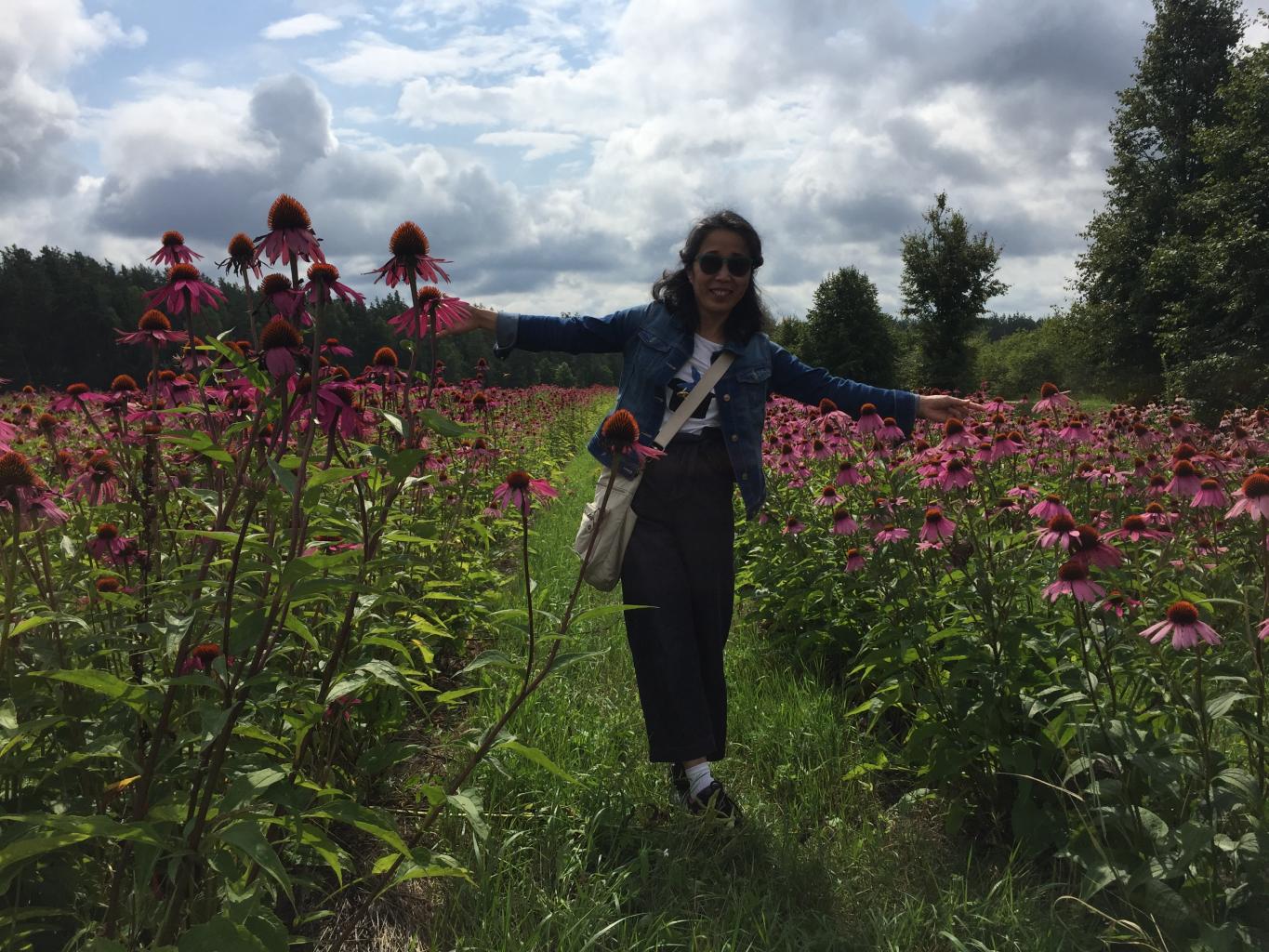
How did you first come to Latvia?
There were multiple reasons. At that time, a lot of Chinese people immigrated to Latvia. We came for our children to get an open education.
What do you teach?
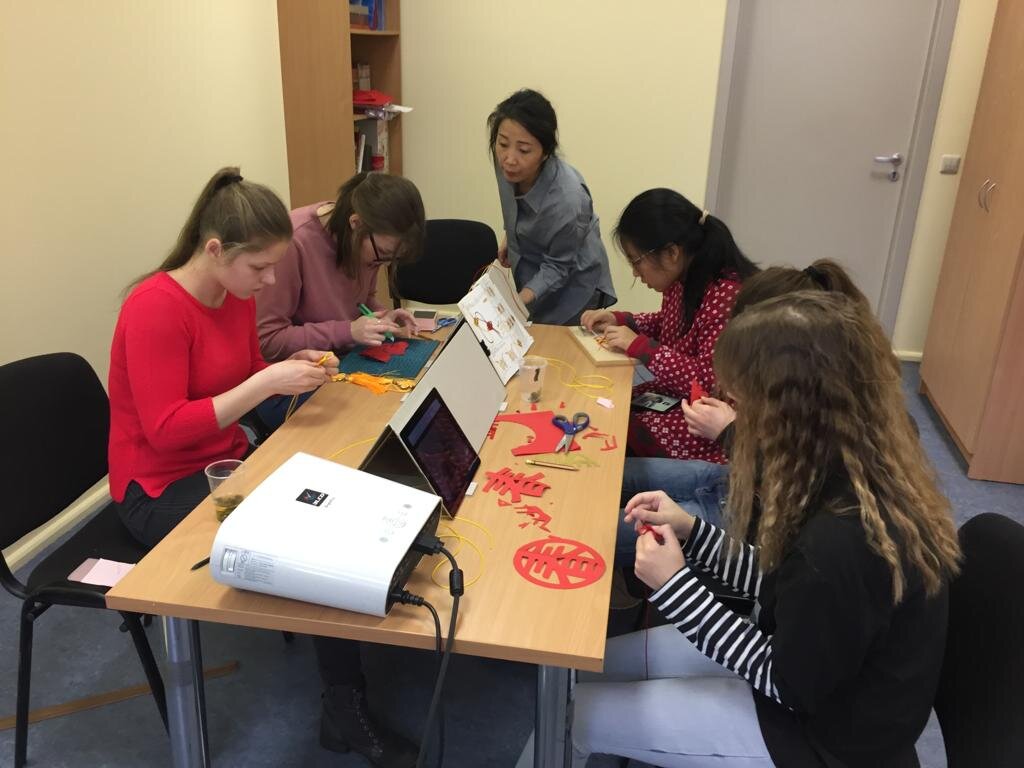
Chen running a crafts workshop at RSU.
The work of the RSU China Studies Centre goes in three directions: research, education, and outreach. My colleague Una Bērziņa-Čerenkova is a doctor in political science. She studies contemporary Chinese politics with a focus on Sino-Russian relations.
Further information
In the education direction, we provide Chinese language courses. These aren't just for RSU students, but for anyone who is interested. We also provide information about Chinese government study scholarships. Several students have gone to China to study there. Our third direction is outreach in the local community. We have cooperated with museums, schools and companies to provide them with information about language, culture, or business. Most of my time is now focused on language education.
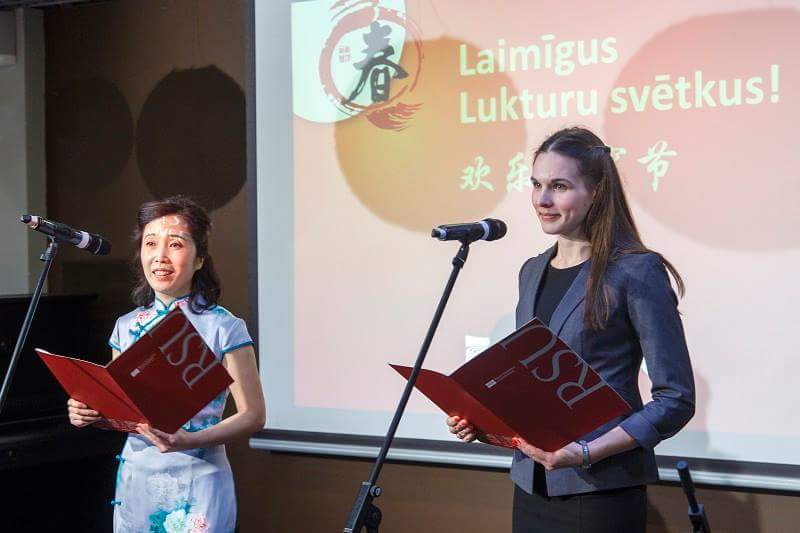
Chen with Una Bērziņa-Čerenkova.
How many people are interested in studying Mandarin?
It's difficult to arrange the times of the classes since we recruit people from the general public. Right now we have a small group of four students.
Have you learned any Latvian?
Yes, I have been learning Latvian for years. 'Es saprotu diezgan, bet ir grūti runāt.' [I can understand, but it's difficult to speak it. - Ed.] Since I have a foreigner's face, people will reply in English every time I try to practice my Latvian! That makes it quite difficult for me to improve.
It's interesting to learn Latvian and I'm quite interested in the ancient poems, the dainas. It's wonderful to have this heritage.
Maybe it's because of my personal interest in language, but I found similarities to Asian culture. The Latvian and Chinese poems have a similar rhythm.
What are the poems about?
I think that poems are all about nature from the very beginning of human civilization. I also like that all the dainas are actually songs! Together with some other Chinese women here, we're trying to learn some Latvian songs. We have a local vocal teacher who is helping us practise.
The Chinese poems are also songs, but we have lost the melodies. It's a pity that it's not like with the Latvian dainas where people still remember the melodies.
I'm thinking about applying some Latvian melodies to the Chinese poems.
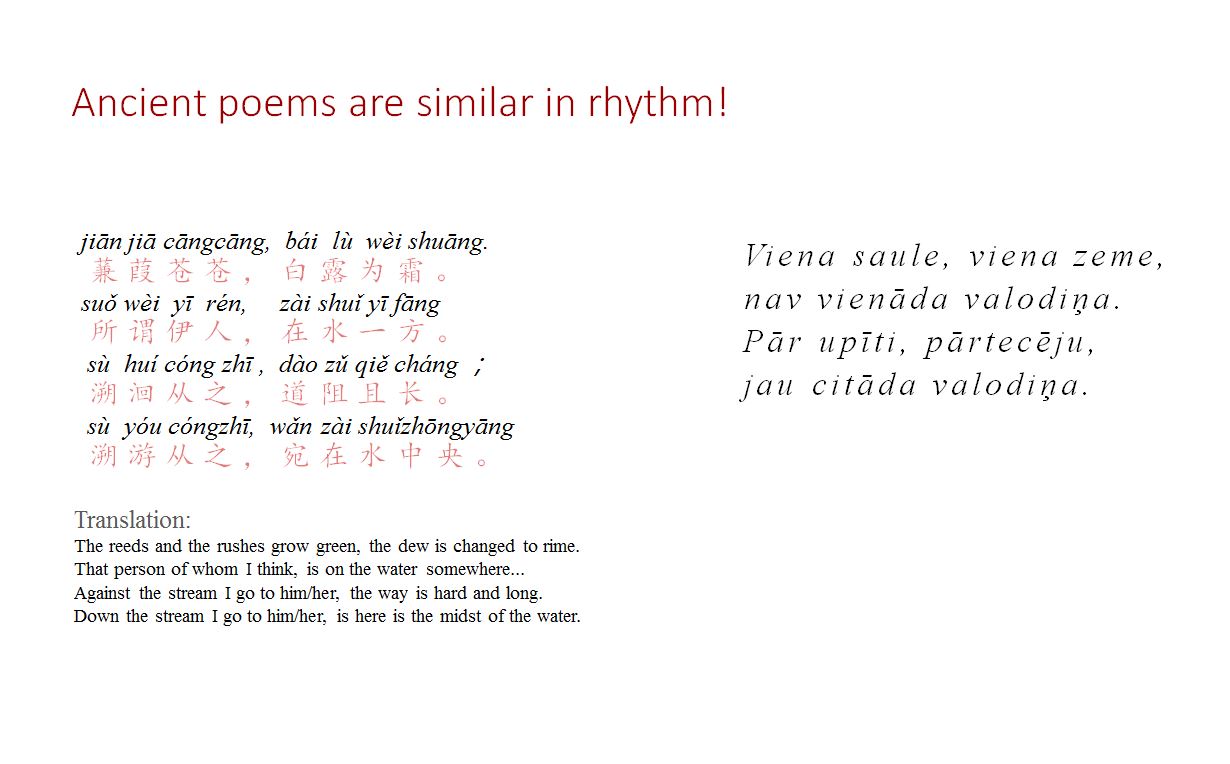 Comparison between an ancient Chinese poem and a Latvian daina.
Comparison between an ancient Chinese poem and a Latvian daina.
How difficult is it to learn Mandarin?
It's quite different. Especially in the writing system. Chinese is based on pictograms whereas most other modern languages are alphabetic. There are no morphological changes in Chinese. I think the western languages are more logical and accurate and Chinese is more like a poem in that you need to get the exact meaning from the context sometimes. The same sentence can have a totally different meaning depending on the context.
Could you give me an example?
'I borrow ten euros from you,' or 'I lend ten euros to you' uses the same word. 借 can mean “borrow" or "lend" so it's the same sentence, but with totally different meanings.
What is it that Latvian students struggle the most with?
The most difficult thing for Latvian students is the tone. Chinese is a tonic language, but western languages have no tone. The voice range we use is quite wide: we have very high pitch, and very low pitch. Normally western people do not speak so high or low.
Students struggle to try to speak in the highest and the lowest pitches. It's not natural for them. It sounds exaggerated, so they need to overcome a barrier to pronounce things correctly.
What was hardest for you when learning Latvian?
I cannot pronounce one sound properly, the "r" sound. I've practised for years. I think the language is about different muscle movements, so you have to practise pronunciation and doing very tiny muscle movements. I am now much better than at the beginning. I've made progress already.
You mentioned that you came here with your children. Tell me about them.
I have two children. My oldest son graduated from the international school already and is now studying in Japan, at Tokyo International University. And my little daughter is still here studying in the French school. She can speak more languages than I can! That's an advantage of studying here. There is no environment for different languages in China. Not a lot of people can speak two languages. My daughter can speak at least four languages now - Latvian, Mandarin, French, and English! She is also studying German in school. And I think she understands some Russian, because of some of her classmates.
How many do you speak?
Chinese, English, and Latvian. 'Es runāju latviski'.
I was surprised that people here know so many languages. All my local friends know at least four. In China, you cannot imagine somebody who speaks four languages.
People would say 'oh, they are talented!' But here it's quite normal. I think learning different languages is good for your brain. When you switch between languages, you become smarter. So Latvian people are clever people thanks to their languages.
Is there a language everyone learns at school in China?
In China today, all schools teach English as a second language. Previously people also learned Russian, like 50-60 years ago, but now most learn English. The Chinese opened up to the world after the 1980s. Before that people did not have a lot of opportunities to practise languages and most still don't speak a foreign language. Younger generations are getting more fluent in foreign languages, however.
What about different regional dialects or languages?
Because China is so big, there's quite a difference between different regions. Although the dialects differ, the written form is the same. It's easy to understand writing, but speaking is hard. I cannot understand Cantonese, for example. Maybe from body language... when you communicate, you can sometimes guess from the situation. But it's hard. I just know a few words in Cantonese, but I know the Shanghai dialect quite well. I lived in Shanghai for over 20 years. Some Chinese people joke that the European languages are kind of like the dialects in Chinese. So maybe it's not so difficult to learn the other languages…
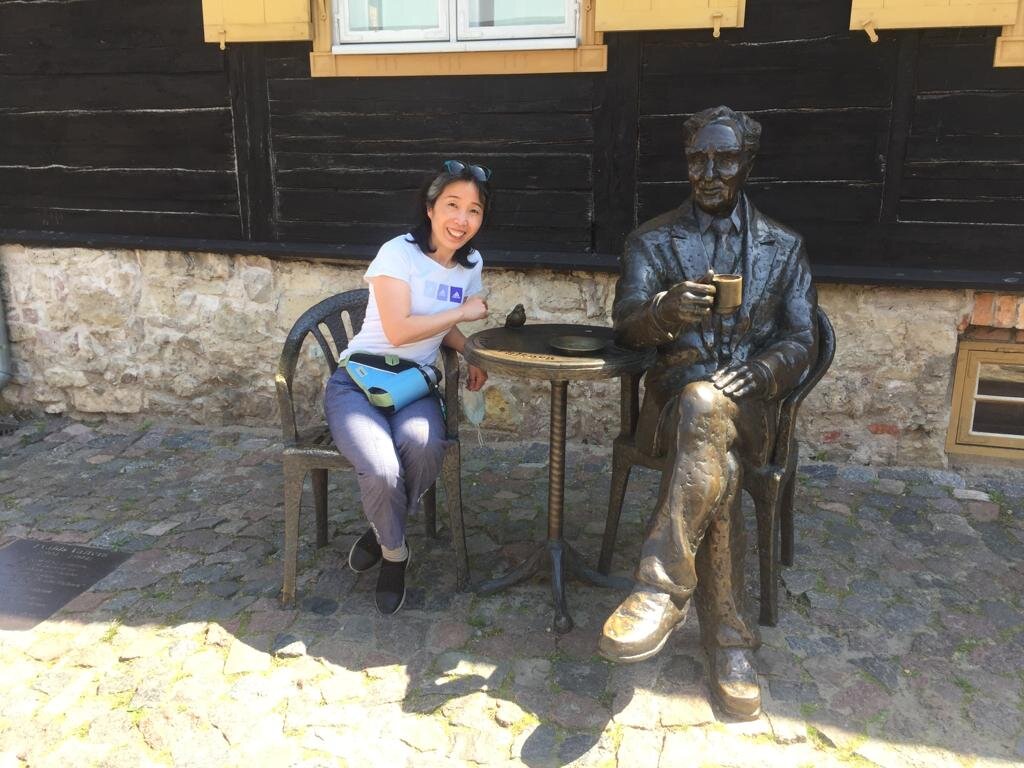
Chen in Kuldīga.
The differences aren't as big as between Latvian and German, but rather like Riga and Latgale. Maybe that's the kind of difference between Chinese dialects, but still people can not understand each other between different regions. Mandarin is the official language, so even though people in the regions have their own dialects, most people need to learn Mandarin in school.
What's your educational background?
I'm not a teacher, I'm actually a designer and I studied industrial design. I like drawing and art.
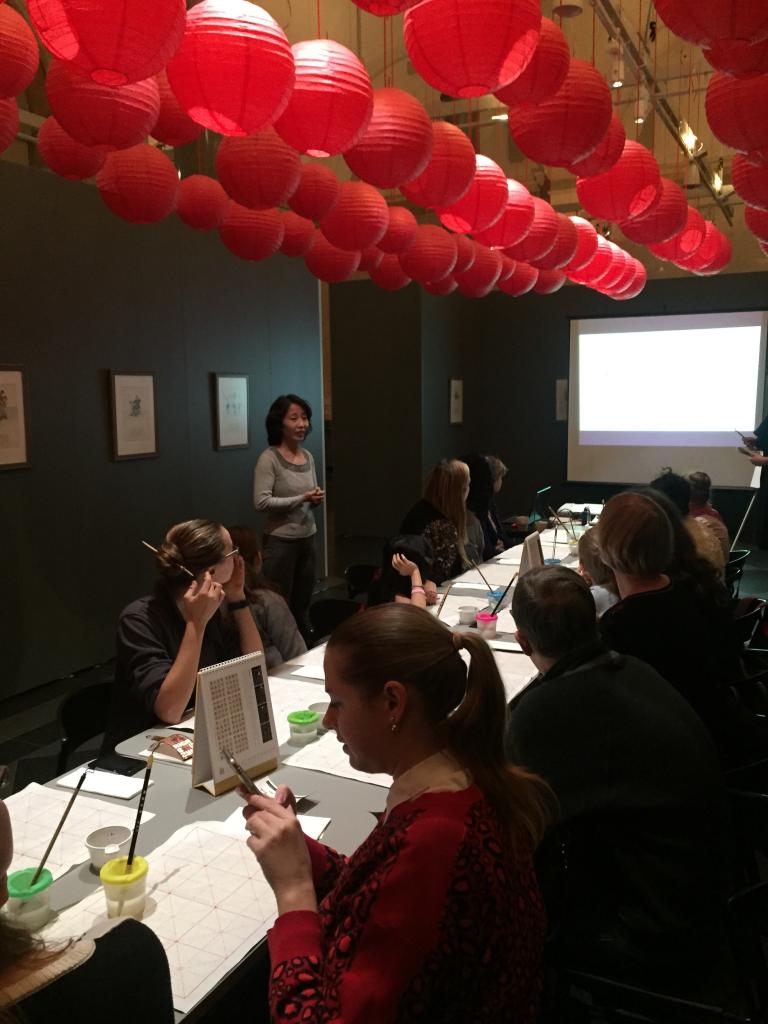
Calligraphy workshop at Rīgas Birža art museum.
What were you doing in Shanghai?
I went to university in Shanghai and I worked there after I graduated.
You said your son is in Japan, do you think he sees a future in Europe?
At the beginning I wanted him to study here and live in Europe, but he decided to go back to Asia to study. He's more interested in Japanese and Asian languages. And also the food! So he decided to move back. Now he's in his second year, so he has some time to decide where to go. The world is open to him. He speaks fluent English, Chinese and is also fluent in Japanese, I think.
Speaking of food, is it possible to get good Chinese food in Riga?
There are several Chinese restaurants I like. There are two called Old Hong Kong and Old Shanghai. And then there's a local Latvian asian food restaurant that I've been to often and that my daughter likes. It's called Fei Fei and it's near RSU, actually.
What Latvian foods do you like?
I think Latvian food is quite healthy. I hadn't tried “rudzu maize”, and “skābais krējums” before I came here. I love it! It's healthy food.
Related news
 From Data Harmonisation to Artificial Intelligence: EUCanScreen Modernises Cancer Screening Across EuropePublic Health, International Cooperation
From Data Harmonisation to Artificial Intelligence: EUCanScreen Modernises Cancer Screening Across EuropePublic Health, International Cooperation


